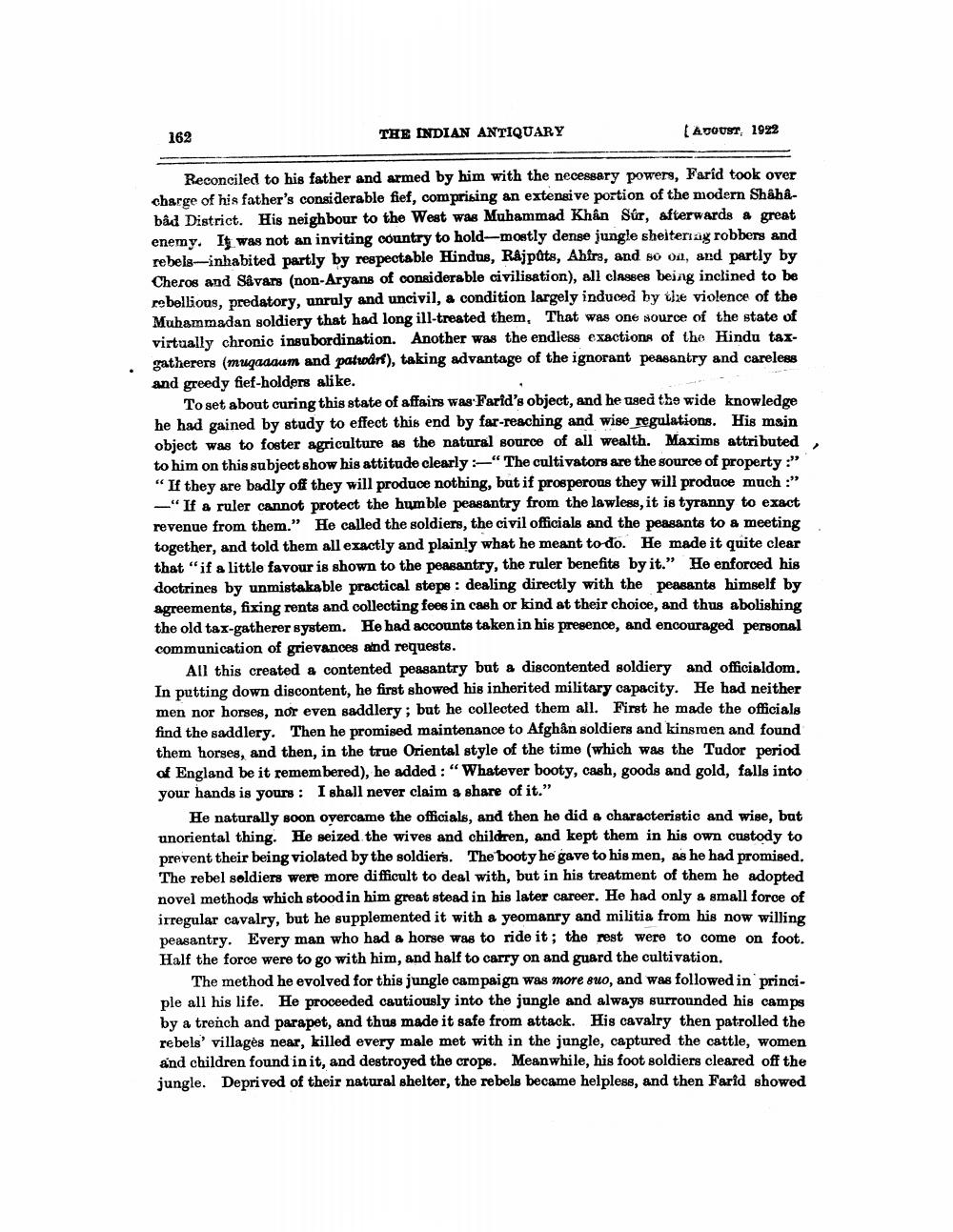________________
162
THE INDIAN ANTIQUARY
(Adoust, 1922
Reconciled to his father and armed by him with the necessary powers, Farid took over charge of his father's considerable fief, comprising an extensive portion of the modern Shâhâbåd District. His neighbour to the West was Muhammad Khân Súr, afterwards a great enemy. It was not an inviting country to hold-mostly dense jungle sheltersay robbers and rebels-inhabited partly by respectable Hindus, Rajputs, Ahfrs, and so on, and partly by Cheros and Savars (non-Aryans of considerable civilisation), all classes being inclined to be rebellious, predatory, unruly and uncivil, a condition largely induced by the violence of the Muhammadan soldiery that had long ill-treated them. That was one source of the state of virtually chronio insubordination. Another was the endless exactions of the Hindu taxgatherers (muqadaum and patrodrt), taking advantage of the ignorant peasantry and careless and greedy fief-holders alike.
To set about curing this state of affairs was Farid's object, and he used the wide knowledge he had gained by study to effect this end by far-reaching and wise regulations. His main object was to foster agriculture as the natural source of all wealth. Maxims attributed to him on this subject show his attitude clearly “The cultivators are the source of property :" "If they are badly off they will produce nothing, but if prosperous they will produce much :" -"If a ruler cannot protect the humble peasantry from the lawless, it is tyranny to exact revenue from them." He called the soldiers, the civil officials and the peasants to a meeting together, and told them all exactly and plainly what he meant to do. He made it quite clear that "if a little favour is shown to the peasantry, the ruler benefits by it." He enforced his doctrines by unmistakable practical steps : dealing directly with the peasants himself by agreements, fixing rents and collecting fees in cash or kind at their choice, and thus abolishing the old tax-gatherer system. He had accounts taken in his presence, and encouraged personal communication of grievances and requests.
All this created a contented peasantry but a discontented soldiery and officialdom. In putting down discontent, he first showed his inherited military capacity. He had neither men nor horses, nor even saddlery; but he collected them all. First he made the officials find the saddlery. Then he promised maintenance to Afghan soldiers and kinsmen and found them horses, and then, in the true Oriental style of the time (which was the Tudor period of England be it remembered), he added : “Whatever booty, cash, goods and gold, falls into your hands is yours : I shall never claim a share of it.”
He naturally soon overcame the officials, and then he did a characteristic and wise, but unoriental thing. He seized the wives and children, and kept them in his own custody to prevent their being violated by the soldiers. The booty he gave to his men, as he had promised. The rebel soldiers were more difficult to deal with, but in his treatment of them he adopted novel methods which stood in him great stead in his later career. He had only a small force of irregular cavalry, but he supplemented it with a yeomanry and militia from his now willing peasantry. Every man who had a horse was to ride it; the rest were to come on foot. Half the force were to go with him, and half to carry on and guard the cultivation.
The method he evolved for this jungle campaign was more suo, and was followed in principle all his life. He proceeded cautiously into the jungle and always surrounded his camps by a trench and parapet, and thus made it safe from attack. His cavalry then patrolled the rebels' villagės near, killed every male met with in the jungle, captured the cattle, women and children found in it, and destroyed the crops. Meanwhile, his foot soldiers cleared off the jungle. Deprived of their natural shelter, the rebels became helpless, and then Farid showed




